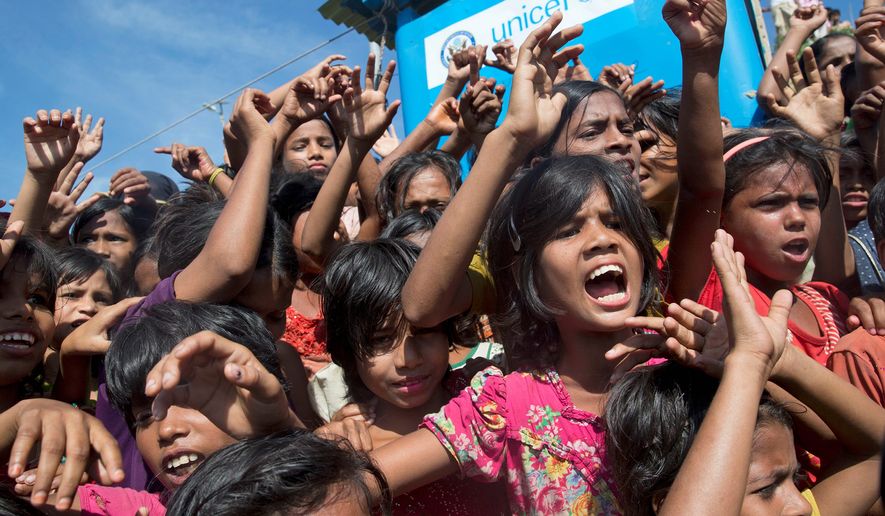OPINION:
Reports out of the Rohingya refugee camps in Bangladesh usually focus on the massive humanitarian efforts carried out by Bangladesh and its international partners. Together, they have supplied food, education, housing and medicine for hundreds of thousands of people with no other place to go.
Even more remarkable is what has not happened. There has been no terrorism, no mass radicalization and no loss of life due to illness, flooding or religious bigotry.
The Rohingya are an ethnic minority that practices a Sufi variation of Sunni Islam. There are an estimated 3.5 million Rohingya worldwide. Prior to 2017, the Rohingya lived primarily in Myanmar’s Rhakine state, where they faced persecution, violence and, often, death. Since then, 740,000 have fled to neighboring Bangladesh, bringing the total number of refugees there to well over a million.
A so-called slow-burn genocide in Myanmar began in 1962, when the military seized power. The Rohingya were stripped of their citizenship rights. The military killed innocent men, women and children, and burned their homes, in 1978, 1991 and 2017.
The Rohingya fled to Bangladesh, which generously gave them sanctuary and extended every public service it could to help them survive their ordeal. The government is vaccinating children and building living quarters and other sturdy types of infrastructure. These actions have been praised around the world, including by Pope Francis, who visited Bangladesh in 2017.
The Rohingya refugees have been provided with more than 8,000 latrine blocks, with up to five latrines per block, as well as 20,000 new wells to ensure hygiene. Four hospitals, five primary health centers, eight health posts and one outbreak-response center have also been built. The Rohingya now have 1,600 learning centers that provide more than 145,000 children education. The government of Bangladesh has also deployed thousands of police to patrol the Rohingya camps.
Bangladesh’s heroic measures have ensured the basic health and safety of the Rohingyas. Nonetheless, the brutal expulsion from their homes has left deep scars. Bangladeshi officials have acknowledged that the Rohingya refugee camps in Cox’s Bazaar are not optimal homesteads. With more than a million desperate, stateless people living in cramped quarters, tensions sometimes run high. Young men and women have lost the opportunity to build full productive lives in their homeland, and many have begun to lose hope.
Experience tells us that individuals in these sad circumstances are susceptible to dangerous and radical influences from religious extremists. Transnational terrorist groups such as al Qaeda and ISIS know this and see these situations as recruitment opportunities. To make matters even worse, foreign fighters are often attracted to regions like this. Examples can be found in the Philippines, where hard times created an opening for the establishment of new Islamist fronts.
The risks are real and ever present. As analyst Richard Horsey, who lives in Myanmar, wrote: “Any long-term hopeless situation is very conducive for recruitment by radical groups who want to pursue their agenda.”
It is a testament to the government that radicalization among the Rohingya has not happened. The relatively peaceful conditions in the camps are a big reason. By providing the tools to keep the Rohingya safe, educated and healthy, while simultaneously balancing security concerns, Bangladesh has held off what doom-and-gloom critics thought was inevitable — terrorist recruitment among the refugees.
But Bangladesh is not resting on its laurels. To better accommodate the vast number of refugees, Bangladesh is in the process of completing additional construction on Bhashan Char, reclaimed land at the mouth of the Meghna River in the Bay of Bengal. The facilities there will accommodate up to 100,000 Rohingya. Cyclone shelters, flood protection embankments and administrative buildings are on the way to completion. Contrary to non-factual reporting by some international media outlets, Bhashan Char is never submerged. All housing and buildings sit on land that is always above water; embankments will prevent flooding during storm surges.
Bangladesh deserves praise for this herculean work. It is keeping the Rohingya safe. It is also keeping them out of the clutches of terrorists.
• Mohammad Ziauddin is the Bangladesh ambassador to the United States.




Please read our comment policy before commenting.